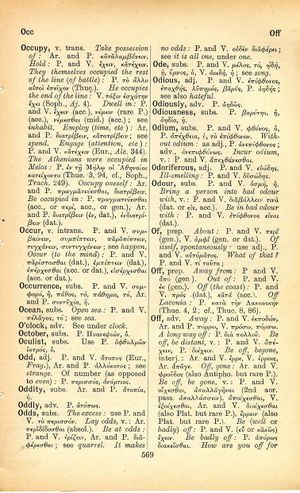occupy
θεὸς δ' ἁμαρτάνουσιν οὐ παρίσταται → God doesn't stand by those who do wrong → A peccatore sese numen segregat → Ein Gott steht denen, die da freveln, niemals bei
English > Greek (Woodhouse)
verb transitive
take possession of: Ar. and P. καταλαμβάνειν.
hold: P. and V. ἔχειν, κατέχειν.
they themselves occupied the rest of the line (of battle): P. τὸ ἄλλο αὐτοὶ ἐπεῖχον (Thuc.).
he occupies the end of the line: V. τάξιν ἐσχάτην ἔχει (Soph., Ajax 4).
dwell in: P. and V. ἔχειν (acc.), νέμειν (rare P.) (acc.), νέμεσθαι (mid.) (acc.); see inhabit.
employ (time, etc.): Ar. and P. διατρίβειν, κατατρίβειν; see spend.
engage (attention, etc.): P. and V. κατέχειν (Eur., Alcibiades 344).
the Athenians were occupied in Melos: P. ἐν τῇ Μήλῳ οἱ Ἀθηναῖοι κατείχοντο (Thuc. 3, 94, cf., Soph., Trachiniae 249).
occupy oneself: Ar. and P. πραγματεύεσθαι, διατρίβειν.
be occupied in: P. πραγματεύεσθαι (acc., or περί, acc., or gen.), Ar. and P. διατρίβειν (ἐν, dat.), ἐνδιατρίβειν (dat.).

